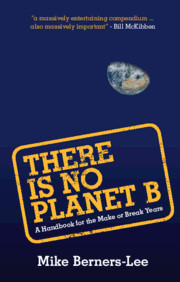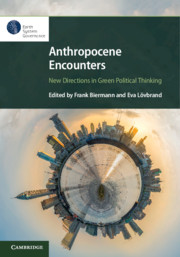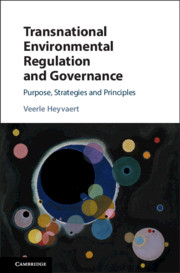Refine listing
Actions for selected content:
2285 results in Ebooks in ecology and environment

There Is No Planet B
- A Handbook for the Make or Break Years
-
- Published online:
- 23 January 2019
- Print publication:
- 28 February 2019

Anthropocene Encounters: New Directions in Green Political Thinking
-
- Published online:
- 21 January 2019
- Print publication:
- 07 February 2019
Preface
-
- Book:
- Transnational Environmental Regulation and Governance
- Published online:
- 09 November 2018
- Print publication:
- 22 November 2018, pp xi-xii
-
- Chapter
- Export citation
3 - Why Regulate beyond the State?
-
- Book:
- Transnational Environmental Regulation and Governance
- Published online:
- 09 November 2018
- Print publication:
- 22 November 2018, pp 50-89
-
- Chapter
- Export citation
2 - The Concept of Transnational Environmental Regulation
-
- Book:
- Transnational Environmental Regulation and Governance
- Published online:
- 09 November 2018
- Print publication:
- 22 November 2018, pp 25-49
-
- Chapter
- Export citation
4 - Strategies for Environmental Regulation
-
- Book:
- Transnational Environmental Regulation and Governance
- Published online:
- 09 November 2018
- Print publication:
- 22 November 2018, pp 90-123
-
- Chapter
- Export citation
Abbreviations
-
- Book:
- Transnational Environmental Regulation and Governance
- Published online:
- 09 November 2018
- Print publication:
- 22 November 2018, pp xiii-xvi
-
- Chapter
- Export citation
Bibliography
-
- Book:
- Transnational Environmental Regulation and Governance
- Published online:
- 09 November 2018
- Print publication:
- 22 November 2018, pp 267-286
-
- Chapter
- Export citation
8 - Legal Principles for Transnational Environmental Regulation
-
- Book:
- Transnational Environmental Regulation and Governance
- Published online:
- 09 November 2018
- Print publication:
- 22 November 2018, pp 215-251
-
- Chapter
- Export citation
6 - The Transformation of Environmental Regulatory Strategies
-
- Book:
- Transnational Environmental Regulation and Governance
- Published online:
- 09 November 2018
- Print publication:
- 22 November 2018, pp 160-181
-
- Chapter
- Export citation
Copyright page
-
- Book:
- Transnational Environmental Regulation and Governance
- Published online:
- 09 November 2018
- Print publication:
- 22 November 2018, pp iv-iv
-
- Chapter
- Export citation
Contents
-
- Book:
- Transnational Environmental Regulation and Governance
- Published online:
- 09 November 2018
- Print publication:
- 22 November 2018, pp vii-x
-
- Chapter
- Export citation
Dedication
-
- Book:
- Transnational Environmental Regulation and Governance
- Published online:
- 09 November 2018
- Print publication:
- 22 November 2018, pp v-vi
-
- Chapter
- Export citation
5 - The Activity-Based Model for TER Strategies Illustrated in Five Easy Pieces
-
- Book:
- Transnational Environmental Regulation and Governance
- Published online:
- 09 November 2018
- Print publication:
- 22 November 2018, pp 124-159
-
- Chapter
- Export citation
7 - Transnational Environmental Regulation and the Challenge to Law
-
- Book:
- Transnational Environmental Regulation and Governance
- Published online:
- 09 November 2018
- Print publication:
- 22 November 2018, pp 182-214
-
- Chapter
- Export citation
9 - Environmental Regulation Transformed
-
- Book:
- Transnational Environmental Regulation and Governance
- Published online:
- 09 November 2018
- Print publication:
- 22 November 2018, pp 252-266
-
- Chapter
- Export citation
Index
-
- Book:
- Transnational Environmental Regulation and Governance
- Published online:
- 09 November 2018
- Print publication:
- 22 November 2018, pp 287-298
-
- Chapter
- Export citation
1 - The Transformation of Environmental Regulation
-
- Book:
- Transnational Environmental Regulation and Governance
- Published online:
- 09 November 2018
- Print publication:
- 22 November 2018, pp 1-24
-
- Chapter
- Export citation

Transnational Environmental Regulation and Governance
- Purpose, Strategies and Principles
-
- Published online:
- 09 November 2018
- Print publication:
- 22 November 2018
Acknowledgments
-
- Book:
- The Urban Ocean
- Published online:
- 10 October 2018
- Print publication:
- 01 November 2018, pp xiv-xiv
-
- Chapter
- Export citation
